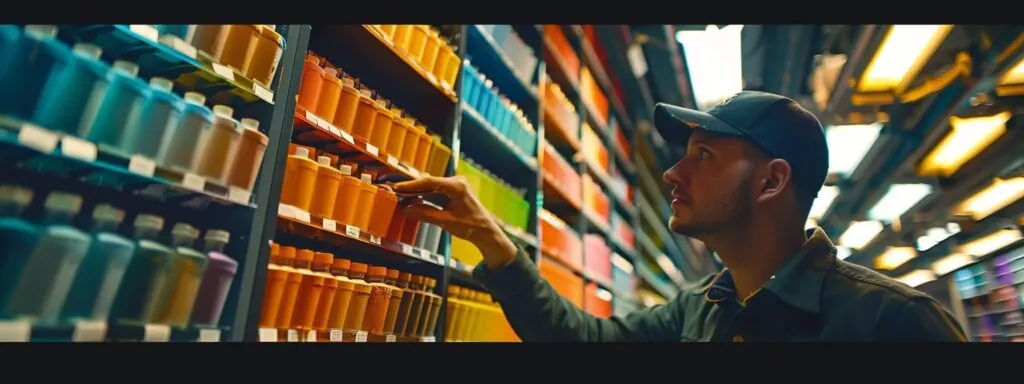Selecting the right commercial building painting contractor can be complex, especially given the abundance of options available. Whether you aim to revamp the exterior for a fresh, welcoming look or update the interior to create a more professional atmosphere, choosing the right contractor is essential to the project’s success.
The right contractor will go beyond simply applying paint; they become a partner who understands your vision, respect your timeline, considers color and decor options, and consistently delivers high-quality work. A knowledgeable and experienced contractor will provide valuable insights on color selection, paint types, and finishes that will enhance the aesthetic and functional value of your building. For further details on finding the right contractor for your project, visit a guide to hiring a painting contractor for your project.
On the other hand, a poor choice in contractors can lead to several issues. Missed deadlines, budget overruns, poor color choices, or work that does not meet quality standards can impact your finances and reputation. A subpar paint job affects not only the building’s appearance but also how clients, tenants, and employees perceive your business.

To make a confident choice, take the time to research potential contractors. Look for ones with proven expertise in commercial projects, strong references, and a clear, professional approach to communication. Ensuring that your contractor is licensed, insured, and familiar with any specific regulations or requirements for commercial buildings is also crucial for a smooth, stress-free project.
This blog will guide you through the key factors to consider when hiring a commercial painting contractor. We will explore how to assess experience, check references, evaluate communication, and review contract details to help you avoid common pitfalls. With the right contractor, you can enhance the appearance of your property and make a positive impression on clients, tenants, or employees. Whether you are managing a small office building or an ample retail space, finding the right team ensures your vision comes to life on time and within budget.
Key Takeaways
- Identify if the painting involves interior, exterior, or both, and consider the building’s condition and business type to set clear goals.
- Commercial interior painting enhances the atmosphere, while exterior painting boosts curb appeal and protects surfaces.
- Prioritize contractors with solid experience, proper licenses, insurance, and a proven track record through references and reviews.
- A reliable contractor safeguards your investment by preventing costly mistakes and ensuring long-term protection.
Ultimately, by choosing a skilled and reputable commercial painting contractor, you invest in the lasting beauty and functionality of your building, creating an environment that reflects your brand’s values and professionalism. Here is what you need to know about choosing the best contractor for your commercial painting job:
What is Commercial Painting
Commercial painting focuses on enhancing and maintaining the appearance of business properties, including offices, retail stores, warehouses, and apartment complexes. It involves applying paints and coatings specifically designed to handle high-traffic environments, ensuring aesthetic appeal and durability.
Unlike residential painting, commercial painting projects are often larger and require meeting specific timelines and safety standards. These jobs demand experienced contractors who understand the unique needs of business spaces and can work efficiently without disrupting daily operations.
Understand the Scope of Your Commercial Painting Project

Before hiring a contractor, it is important to understand the scope of your commercial painting project. Knowing what your building needs—whether it’s an interior touch-up, a full exterior repaint, or both—helps you set realistic goals and find the right contractor. Several factors, such as whether the work is indoors or outdoors, the type of business, and the building’s current condition, all impact the approach and materials used.
Interior vs. Exterior Painting
Interior and exterior commercial painting serve different purposes. Commercial Interior painting focuses on enhancing the look and feel of the space, creating an inviting environment for employees and customers. It may require specific paint types to minimize fumes and ensure quick drying to avoid disrupting business operations. Interior and exterior commercial painting serve different purposes.
Exterior painting, on the other hand, emphasizes protection and curb appeal. Paint for exteriors must withstand weather elements, including rain and UV rays while complementing the surrounding architecture. Understanding the differences ensures your contractor uses suitable materials and techniques for each setting.
Type of Business
The type of business you operate influences the painting approach. A retail store may need vibrant colors to attract customers, while a corporate office might benefit from neutral tones that promote focus and professionalism.
Industries like healthcare or hospitality require special coatings, such as antimicrobial or stain-resistant paints, to meet safety and hygiene standards. Knowing your business’s unique needs helps you and the commercial painter choose the suitable color schemes and finishes.
Condition of the Property
The property’s current condition affects how the painting project is planned. Older buildings may need more preparation, such as cleaning, sanding, or repairs before painting can begin. Cracked or peeling surfaces, mold, or damaged walls will require additional work to ensure the new paint adheres properly. Cleaning, sanding, or repairs are crucial steps in the preparation phase.
In contrast, newer or well-maintained buildings may only need a fresh coat of paint to restore their appearance. By assessing the property’s condition early, you can avoid unexpected delays and ensure the painting process runs smoothly.
Qualities to Look for in a Commercial Building Painting Contractor
Choosing the right commercial building painting contractor requires more than just comparing prices. Finding a contractor with the skills, experience, and reliability to handle your project efficiently is important. Here are the top qualities to consider when selecting a contractor:
Experience and Expertise
A contractor with extensive experience in commercial painting is more likely to understand the complexities of large-scale projects. Look for contractors who have worked on similar properties or industries, as they’ll know the right techniques, paints, colors, and materials for your specific needs.
Licenses and Insurance
Always verify that the contractor has the proper operating licenses in your area. Licensed contractors follow industry regulations and meet local codes, which helps you avoid legal issues. Insurance is equally important; it protects you from liability if accidents or property damage occur during the project.
References and Reviews
References and online reviews give you a clear picture of the contractor’s reputation. A reliable contractor will be transparent and provide references from past clients, allowing you to confirm the quality of their work. Additionally, checking online reviews on platforms like Google or Yelp helps you gauge their reliability, professionalism, and customer satisfaction.
Quality of Materials and Techniques
The longevity of your paint job depends heavily on the quality of materials used. A professional contractor will recommend premium paints and coatings that suit your building’s specific needs, whether for interior or exterior use. In addition to using high-quality materials and paints, the contractor should employ modern techniques and tools to ensure a flawless finish.
Why Choosing the Right Contractor Matters for Your Business

Hiring the right commercial painting contractor is crucial because their work directly impacts your business’s image and long-term value. Here’s why selecting the right contractor is essential for your business success.
First Impressions and Branding
Your building’s appearance is often the first thing customers or clients notice, setting the tone for their overall experience with your business. A professionally painted exterior reflects care and attention to detail, which helps build trust and reinforces your brand image. Whether bold colors for retail spaces or sleek, neutral tones for offices, the right contractor ensures your building’s appearance aligns with your brand. For more details on why choosing a local painting company is advantageous, check out why hiring a local painting company is the best choice.
Protecting Your Investment
Painting your commercial building is an investment; choosing the right contractor ensures that investment pays off. Professional contractors use high-quality paints and proper surface preparation to prevent premature wear, peeling, or damage caused by weather and daily use. This proactive approach enhances the building’s appearance and extends the paint’s lifespan, reducing the need for frequent touch-ups.
Conclusion: Making the Right Choice for Your Business
Choosing the right commercial building painting contractor is essential to ensure your project is completed smoothly, on time, and with lasting results. A reliable contractor brings experience, proper licensing, high-quality materials, and positive customer feedback, all of which contribute to the success of your project.
The right team enhances your building’s appearance, protects your investment, and reinforces your brand image. With thoughtful planning and careful selection, you can find a contractor who meets your business’s unique needs and delivers a paint job that stands the test of time. Contact South Shore Painting Contractor to get a free estimate.
Frequently Asked Questions
How do you quote a commercial painting job?
Quoting a commercial painting job involves assessing the scope and complexity of the project. Contractors consider factors such as the building’s size, condition, whether the work is interior, exterior, or both, and any special requirements, like specific paint types or coatings for durability and aesthetics. The quote may also include labor, materials, time frame, and any preparatory work like cleaning or repairs. Clear communication about these elements helps contractors provide accurate and transparent quotes.
What is the difference between commercial and industrial painters?
Commercial painters primarily focus on enhancing the appearance and durability of business properties, such as office buildings, retail spaces, and apartment complexes, using paints and finishes designed for aesthetic and protective purposes. Industrial painters, on the other hand, work in environments like factories, warehouses, and plants, where the focus is more on protective coatings that can withstand harsh conditions like extreme temperatures, chemical exposure, or heavy machinery. Industrial painting often requires specialized materials and techniques to ensure surfaces remain functional and safe under these conditions.
Is commercial painting hard?
Commercial painting can be challenging due to the size of projects, the need to work within specific timelines, and the demand for high-quality, durable finishes. Painters often need to work around business hours to avoid disrupting operations, requiring flexibility and efficient planning. Additionally, commercial projects may require specialized coatings, safety compliance, and experience in handling high-traffic areas, making it more demanding than typical residential painting.
How can you tell a good paint job?
A quality paint job will have even color and consistent coverage, with no visible brush strokes, drips, or uneven patches. Edges around doors, windows, and trims will be sharp and clean, and the surface should feel smooth to the touch. Additionally, a professional paint job lasts longer without peeling, cracking, or fading due to high-quality materials and proper surface preparation, like cleaning, sanding, and priming.
What skills do painters need?
Commercial painting contractors need precision, attention to detail, and experience with different tools and techniques to deliver high-quality work. Skills like color matching, surface preparation, knowledge of various paint types, and finishing techniques are essential. They must also understand safety regulations, particularly for commercial projects, and should be able to work efficiently to meet deadlines, especially when working around business schedules.
How do you negotiate a painter’s price?
Negotiating a commercial painter’s price involves understanding the project scope and setting a budget. To negotiate effectively, ask for itemized quotes to understand costs related to materials, labor, and any additional work like repairs. Discuss your budget and ask about alternatives in paint types or finishes that may reduce costs without sacrificing quality. It’s also a good idea to compare quotes from multiple contractors and ask about payment terms, warranties, or discounts for large-scale or repeat work.






